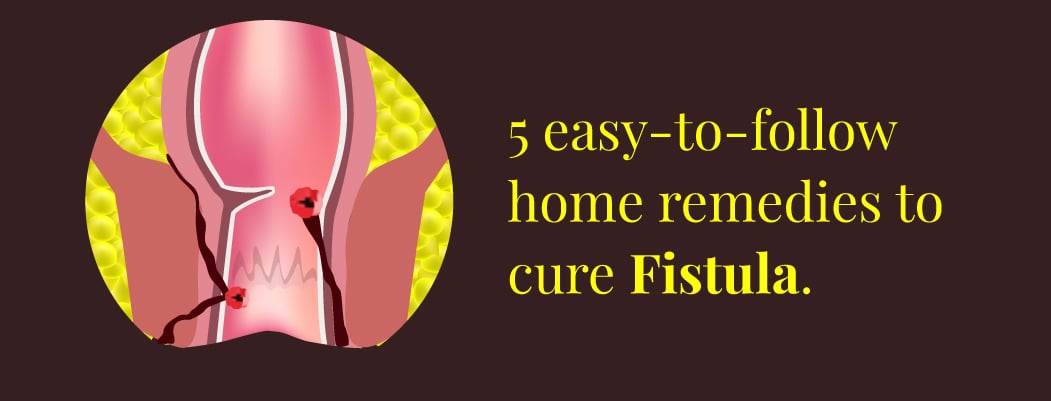How to cure fistula permanently at home
December 3, 2022

Overview
An abnormal connection, such as one between a blood vessel and another structure or an organ and another body area, is called a fistula. Injury or surgery are the usual causes of fistulas. However, a fistula can also develop due to an infection or inflammation.
Different areas or portions of the human body might develop fistulae. Fistulas can also form in other areas of the body, such as between the throat and neck, the colon and the skin nearby, an artery and vein, etc. An infected tunnel between the anus and the perianal skin is an anal fistula. The anal opening is where this canal’s exterior entrance is located.
The individual is encouraged to drink plenty of liquids, especially water, and to eat a balanced, high-fibre diet in cases of anal fistula. This results in developing a soft stool and lessening the pressure needed to pass stools. Passing a firm stool can be highly unpleasant and challenging for people with such illnesses. When using the restroom, the patient should maintain their hygiene. Infections with the disease already present and other problems can result from unhygienic conditions.
Anal Fistula: An anal fistula is used to describe the infected tube that forms between the anus and the perianal skin. The anal opening is where the fistula’s one end is located. A fistula is typically discovered in a person who had an anal abscess earlier. A fistula can also be brought on by other severe conditions like Crohn’s disease, cancer, warts, radiation, trauma, etc. Fistula is typically a complaint of an obese person who spends a lot of time sitting and doesn’t engage in regular physical activity. Adults are more likely than children to get a fistula. A substantial risk of anal fistula exists in people who have perianal abscesses.
Symptoms
- Anal opening, in particular, is surrounded by pain, swelling, itching, irritation, or sore skin.
- Discharge of blood
- Bowel movements that hurt. In the later stages of the illness, the patient may also express pain while urinating.
- Fever and exhaustion
- discharge with a foul odour coming from the anal aperture
Home remedies for Anal fistula
The Top 7 Home Treatments for Anal Fistula Include:
Sitz Bath
One of the greatest ways to treat anal fistula symptoms, which include irritation, swelling, pain, and inflammation, is to take a sitz bath. Anal area bathing in simple, warm water is known as a sitz bath. The water shouldn’t be too hot. A fistula patient should sitz bathe at least three to four times daily. (Read about the advantages of sitz baths and how to take one here)
Healthy food
Keep your stomach and digestive system healthy by watching what you eat. Improve digestive conditions that are less susceptible to issues by avoiding hot, junk, and fatty foods. Increase your intake of whole grains, leafy greens, fruits, and lean meats. Constipation can irritate a fistula, so eating more fibre-rich foods like cereal will help you prevent it. You can employ a few kitchen tricks to relieve fistula symptoms, including:
- Honey: Honey has antibacterial properties, and regular ingestion benefits overall health. One tablespoon of honey should be combined with a glass of warm water.
- Oregano Oil: You can cure fistulas using oregano oil. Antibacterial, antiviral, antibiotic, and anti-inflammatory activities are present in the oil.
- One spoonful of ground flaxseed powder should be added to a glass of water. Then, before going to bed, give it a good stir. It aids in controlling bowel movements.
Drink water
One of the finest home remedies for fistula is to drink lots of water. Avoid soda and alcohol; drink a ton of water and fruit juices. Ginger tea, turmeric milk, etc., are options. Constipation strains your fistula; therefore, doing this will prevent it. In addition, a surplus of water will soften waste and assist in intestinal cleaning.
Use donut pillows
Avoid the added pressure on your back, buttocks, and legs if your toilet job requires you to sit down for extended periods, especially if you have an anal fistula. This might be achieved by using a “donut pillow” instead of a standard chair or simply sitting on the toilet seat.
Maintain proper bathroom hygiene
After using the bathroom or having a bowel movement, always wash your anal area. The first step in preventing an illness is to avoid any bacteria that may still be present on your skin. Always carry wipes while outside in the open and if you can’t wash them. Because they come into contact with germs the most, your hands need to be cleaned frequently. If the fistula leaks throughout the day, change your underwear as needed. This will stop the growth of bacteria and the spread of germs, which can lessen perianal irritation and assist in eliminating the bothersome symptoms related to fistulas.
Strengthen your immunity
A nutritious diet that includes foods high in omega-3s, omega-6s, and vitamin C, such as fish, olive oil, and citrus fruits, will help you build a stronger immune system and reduce any inflammation fistula could bring on.
When to see a doctor
The symptoms of anorectal disorders include blood or pus discharge, constipation, pain, itchiness, swelling, redness, or soreness around the anal area. The prevalence of anorectal diseases must rise dramatically due to poor eating habits, sedentary lifestyles, and inadequate hydration consumption. Therefore, such signs should be considered. Before seeing a doctor, the patient should never use any medications for these conditions. An anal fistula is one disease that shouldn’t be overlooked. These conditions may also be merely symptoms of more severe conditions like cancer. As soon as you notice these symptoms, see a doctor specialising in colon and rectal diseases.
People also ask
1. Can a fistula repair itself?
Anal fistulas typically do not heal on their own, necessitating surgery to treat them.
2. What food cures fistula?
People with fistulas should consume lots of water and include fibre-rich foods in their daily diet. In addition, green leafy vegetables, fresh fruits, brown rice, and fish can be incorporated into their diet.
3. What is the main cause of fistula?
Fistulas can develop as a result of inflammation or infection in addition to trauma or surgery. Fistulas are channels of infection that can occur when the lining of the intestine becomes ulcerated.








